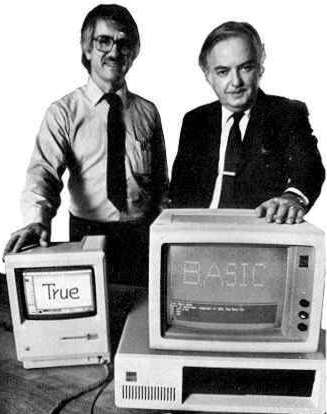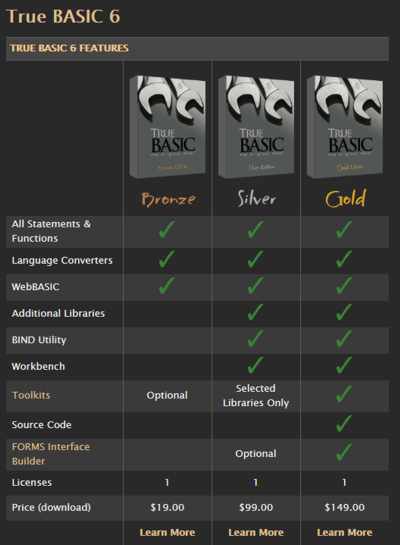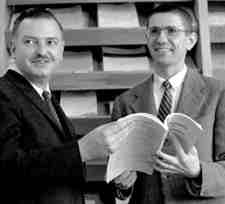| Kemeny & Kurtz - The Invention Of BASIC |
| Written by Historian | |||||||
Page 3 of 3
True BASICClearly Kemeny and Kurtz were affected by the attack on their language which they knew was the best for teaching programming to the non-specialist. But they had to do something to defend their language against the growing flood of street BASICs that often abandoned the principle that above all else the language should be easy to use either because they needed a quick fix or more often because of the limitations of the hardware. Their response was to create and market True BASIC - a fully structured compiled language.
True BASIC introduced many of the language forms that we now take for granted in more common dialects - IF..THEN..ELSE, DO..LOOP and the EXIT DO. Personally I think that we owe as much of a debt to True BASIC in providing an operational standard for Microsoft and other dialects as we do for the invention of the language. In retrospect, True BASIC never really made it to the wider audience that say GW, Q, Power or Visual Basic did. Kurtz remained of the opinion that True BASIC has much to offer the beginner and even suggested that Visual BASIC might have to be considered dangerous. And while other BASICs are now assigned to history True BASIC is still a commercial product and there are free downloadable demos of theBronze edition at the True BASIC website.
As well as co-inventing BASIC, Kemeny was president of Dartmouth college for 11 years and served on the commission that looked into the causes of the Three Mile Island nuclear accident. Kurtz has spent much time trying to produce the official standard for BASIC and retired from Dartmouth to give his attention to True BASIC Inc. You get the feeling that neither Kemeny nor Kurtz liked what Bill Gates did to their language and regarded him as an interfering outsider, concerned with marketing and money. Yet I think the three of them shared a common view of the language as a the most practical of tools to get a program implemented. Gates has been quoted as telling his development teams that he could get the same job (no matter what it was!) done using BASIC in just a few minutes. Kemeny and Kurtz really should have been proud of him.
John Kemeny and a vanity plate that proves he was proud of BASIC
It is still true that a special language aimed at beginners and non-specialists is something we need. The big problem today is that there is no obvious candidate to take BASIC's place. Modern languages are complex and having to master object oriented ideas or whatever the programming philosophy is that they embody makes it harder to see the basics of writing even simple algorithms. Today we have graphical languages like Scratch but there are few text based languages simple enough for a beginner. Perhaps we still need BASIC. More InfomationBASIC at 50 A Dartmouth Celebration To learn more about True BASIC and find software, visit truebasic.com To find out more about the philosophy of BASIC read "Back to BASIC" by Kemeny and Kurtz included in side panel.
Related ArticlesA Programmer's Guide to Scratch 2 Small Basic - The Programmer's Guide To be informed about new articles on I Programmer, sign up for our weekly newsletter, subscribe to the RSS feed and follow us on Twitter, Facebook or Linkedin.
<ASIN:0201134330> <ASIN:0671880748> |
|||||||
| Last Updated ( Wednesday, 20 November 2024 ) |




